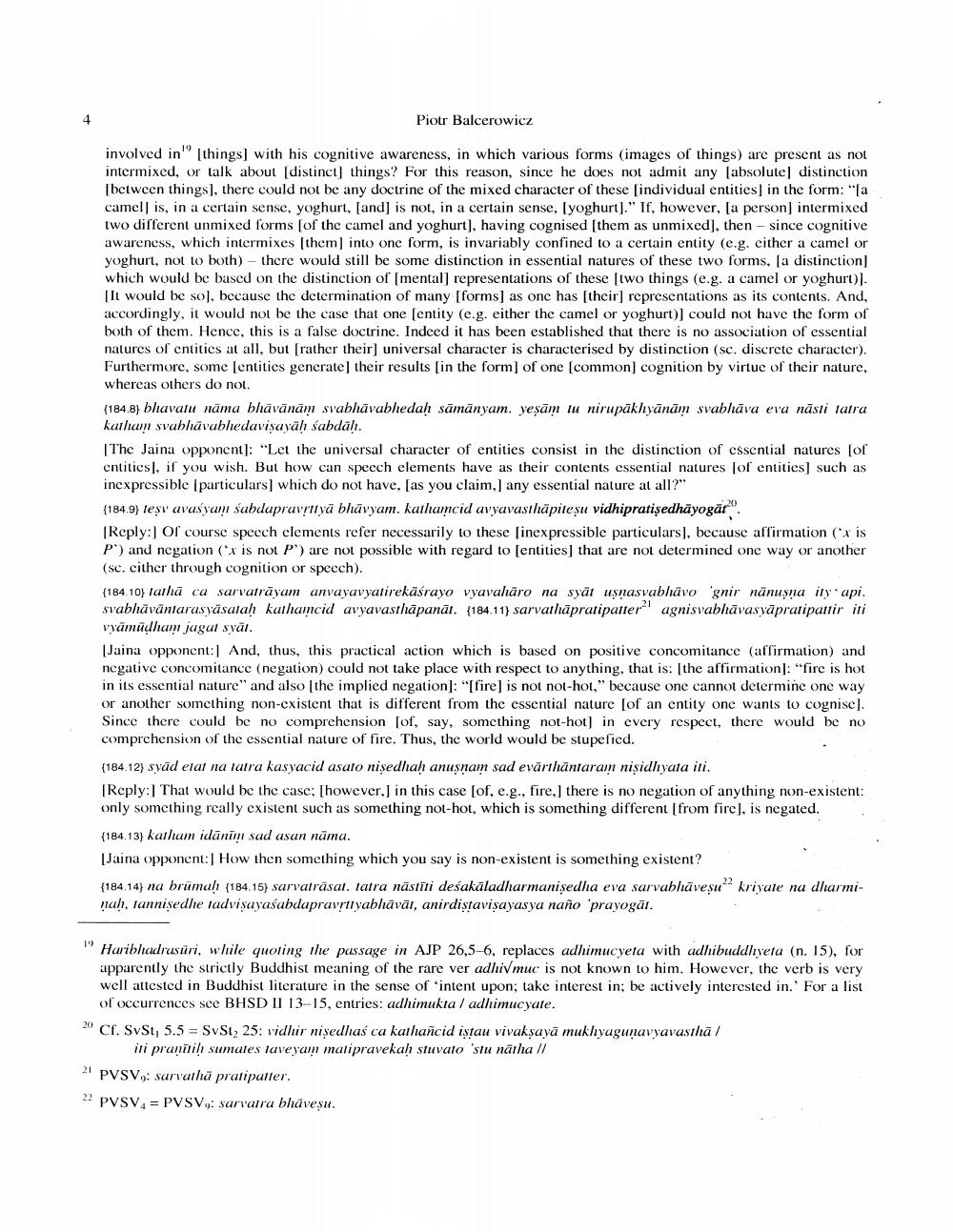Book Title: Dharmakirtis Criticism Of Jaina Doctrine Of Multiplexity Of Reality Anekantavada Author(s): Piotr Balcerowicz Publisher: Piotr Balcerowicz View full book textPage 4
________________ Piotr Balcerowicz involved in things with his cognitive awareness, in which various forms images of things) are present as not intermixed, or talk about distinct) things? For this reason, since he does not admit any labsolute distinction [between things), there could not be any doctrine of the mixed character of these findividual entities in the form: "La camell is, in a certain sense, yoghurt, [and] is not, in a certain sense, Lyoghurt]." If, however, la person] intermixed two different unmixed forms (of the camel and yoghurt), having cognised [them as unmixed], then - since cognitive awareness, which intermixes (them) into one form, is invariably confined to a certain entity (e.g. either a camel or yoghurt, not to both) - there would still be some distinction in essential natures of these two forms, la distinction] which would be based on the distinction of [mental] representations of these two things (e.g. a camel or yoghurt)). [It would be so), because the determination of many [forms] as one has [their representations as its contents. And, accordingly, it would not be the case that one sentity (e.g. either the camel or yoghurt)] could not have the form of both of them. Hence, this is a false doctrine. Indeed it has been established that there is no association of essential natures of entities at all, but (rather their universal character is characterised by distinction (sc. discrete character). Furthermore, some (entities generate) their results (in the form of one (common cognition by virtue of their nature, whereas others do not. (184.8) bhavalu nama bhävänām svabhāvabhedah sāmānyam. yeşām tu nirupākhyānām svabhāva eva năsti Tatra kaihan svabhāvabhedavisavāh sabdah. [The Jaina opponent]: "Let the universal character of entities consist in the distinction of essential natures of entities, if you wish. But how can speech elements have as their contents essential natures of entities such as inexpressible (particulars) which do not have, [as you claim any essential nature at all?" {184.9} test avasyam sabdapravrityā bhāvyam. kaihancid avyavasthāpileşu vidhipratiședhāyogar (Reply:1 Of course speech elements refer necessarily to these finexpressible particulars), because affirmation (xis P') and negation (*.x is not P') are not possible with regard to [entities that are not determined one way or another (sc. cither through cognition or specch). (184.10} tathā ca sarvatrāyam anvayavyalirekasrayo vyavahāro na syāt usnasvabhavo gnir nānusna ity.api. svabhāvāntarasyāsalah kathamcid avyavasthāpanāt. (184.11) sarvathāpratipatter? agnisvabhāvasyāpratipattir iti vyāmūdham jagul syāt. [Jaina opponent:] And, thus, this practical action which is based on positive concomitance (affirmation) and negative concomitance (negation) could not take place with respect to anything, that is: (the affirmation]: "fire is hot in its essential nature" and also the implied negation]: "[fire) is not not-hot," because one cannot determine one way or another something non-existent that is different from the essential nature of an entity one wants to cognise]. Since there could be no comprehension [of, say, something not-hot in every respect, there would be no comprchension of the essential nature of fire. Thus, the world would be stupefied. {184.12) syād elal na latra kasyacid asalo nisedhah anusnam sad evārthāntaram nişidhyata iti. (Reply:] That would be the case; [however, in this case [of, e.g., fire, there is no negation of anything non-existent: only something really existent such as something not-hot, which is something different [from fire), is negated. {184.13) katram idānīm sad asan nāma. Jaina opponent: How then something which you say is non-existent is something existent? (184.14) na brūmah (184.15) sarvatrāsal. tatra nāstīti deśakāladharmanisedha eva sarvabhāvesu kriyale na dharminah, tannisedhe ladvisayasabdapravrilyabhāvāt, anirdistavisayasya naño 'prayogāi. Haribhadrusüri, while quoling the passage in AJP 26,5-6, replaces adhimucyeta with adhibuddhiyeta (n. 15), for apparently the strictly Buddhist meaning of the rare ver adhiv muc is not known to him. However, the verb is very well attested in Buddhist literature in the sense of 'intent upon; take interest in; be actively interested in.' For a list of occurrences see BHSD II 13-15, entries: adhimukta / adhimucyate. 20 Cl. SvSt, 5.5 = SvSt. 25: vidhir nişedhas ca kathancid istau vivakṣayā mukhyagunavyavasthā / ili pranii sumales lave yam malipravekah stuvalo 'stu näiha // 21 PVSV.: sarvathā pralipaller. 22 PVSV = PVSV,: sarvatra bhäveşu.Page Navigation
1 2 3 4 5 6 7 8 9 10 11 12 13 14 15 16 17 18 19 20 21 22 23 24 25 26 27 28 29 30
